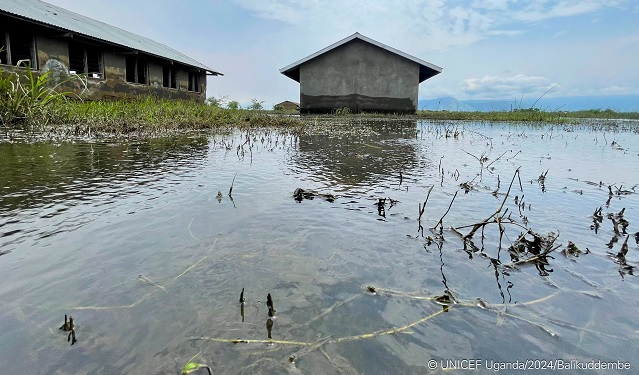
Kampala, Uganda | THE INDEPENDENT | As the implementation of the fourth National Development Plan (NDP IV) commences, driving development for the next five years, a look at its predecessor (NDP III) shows a mixed performance, especially regarding climate.
An expert assessment shows that most of the most critical areas in terms of vulnerability to climate change have been inadequately attended to.
Uganda frequently experiences extreme weather vagaries, like floods, landslides, and prolonged droughts, as well as heat waves, as was experienced in January to March this year.
Experts say the temperatures soared to 40⁰C in some parts of the country was unprecedented, telling the story of real climate change in Uganda.
Increasingly, Uganda is getting accustomed to devastation of crops and livestock during longer droughts than previously known, broken bridges, submerged roads and city suburbs and mud/landslides in the eastern, western and southwestern parts.
Yet, over the last three years, there has been a decrease in the climate budget, especially for locally funded programmes, according to a Climate Budget Compliance Assessment Report led by ACODE, a public policy and advocacy think-tank.
With the Fourth National Development Plan (NDP IV) already approved, this analysis provides insights into the country’s progress with climate-change-sensitive development programming and action, while highlighting gaps in climate finance integration.
Overall, the alignment of the 2024/25 Annual Budget to climate change interventions was a reduction from the 54 percent scored in 2023/24 to 53 percent compliance, which has been termed “unsatisfactory”.
”In addition, at 58 percent compliance, budgetary performance for the financial year 2025/26 (as per the Budget Framework Paper) is unsatisfactory. It is lower than in the Budget Framework Paper 2024/25 of 62 percent,” the report says.
This is partially attributed to the Rationalisation of Public Expenditure (RAPEX) through mergers of public entities.
The planned climate change activities and their budgets were transferred to lead ministries, departments and agencies (MDAs), “whose impact is yet to be seen,” it notes, adding that therefore, the scoring for the Budget Framework Papers for the merged agencies got distorted somehow.
In effect, the climate change compliance of annual budgets during the period of NDPIII was on an upward trend for the first two years, from 50 percent in 2020/21 to 65 percent in 2021/22 and a reduction to 46.1 in 2022/23. However, it increased to 54.1 percent in 2023/24 and slightly sank to 53.18 in 2024/25.
As for the Budget for 2025/26, though unsatisfactory, the score of 44.8 percent is attributed to the transition from NDPIII to NDPIV, which has required a review of climate change interventions and related outputs and indicators.
However, there is hope going forward as the government aligns programmes within the MDA after RAPEX.
”The government continues to make efforts to promote climate change activities through mapping of all climate change indicators in Programme Implementation Action Plans, for appreciation by MDAs, and adoption and integration of the climate change budget tagging in the Programme Budgeting System (PBS),” the report says.
The establishment of the Climate Finance Unit in the MoFPED, the development of the National Climate Finance Strategy 2025, and the increased advocacy and lobbying by non-state actors are expected to improve climate budget monitoring and compliance.
On the other hand, the assessment found that there is a high focus on administration and soft climate change interventions, such as awareness creation and coordination relative to hardware response, such as building climate-resilient infrastructure.
This may be attributed to the meagre allocations accompanied by significant budget cuts.
”Nonetheless, the fluctuations in the trends of budget compliance are probably attributed to the increasing, although varying, appreciation of the negative impacts of climate change on the attainment of programme goals.”
The assessment shows that the aligned climate change interventions fall short in terms of ambition, and the Annual Budget targets fall far below the NDPIII and NDC targets.
Uganda has priority areas, including those under the “Nationally Determined Contribution (NDC)” under the Paris Agreement, which is a commitment to reduce greenhouse gas emissions.
The assessment of the budgetary allocations to these shows that Regional Development was the most well-funded with a score of 87.5, followed by Sustainable Urban Development with 75 and Human Capital Development with 71.7.
Others that scored fairly were Sustainable Development of Petroleum Resources (66.7), Private Sector Development (60), Development Plan implementation (55) and Natural Resources, Environment, Land and Water Management at 53.3.
Poor performers were Manufacturing (10), Tourism (30), Agro Industrialisation (37.1) and Integrated Transport Infrastructure Services with a score of 38.2.
According to the assessment, the programmes that had unsatisfactory performance are the most vulnerable to climate change hazards.
The satisfactory performance in some programmes is partly attributed to the differences in resource allocation toward mitigation and adaptation-oriented interventions.
Programmes for mitigation of the causes of climate change are being better funded than adaptation programmes, apparently because assistance from development partners largely goes to mitigation interventions, although Uganda’s priority is adaptation,” it states.
*****
URN
 The Independent Uganda: You get the Truth we Pay the Price
The Independent Uganda: You get the Truth we Pay the Price



